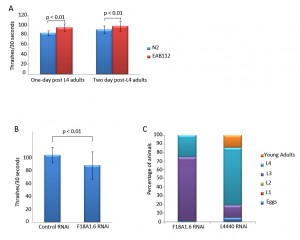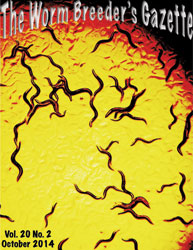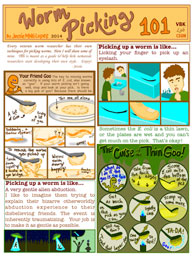Mutations in the human C9ORF72 gene cause frontotemporal dementia and amyotrophic lateral sclerosis (Boeve et al., 2012; Renton et al., 2011). The normal and abnormal functions of this gene are unknown, and data from animal models have not been previously reported. We have characterized developmental and behavioral phenotypes in mutants of F18A1.6, the C. elegans homolog of C9ORF72. The in-frame insertion/deletion allele ok3062 was backcrossed to wild type six times, and no gross abnormalities were noted in development and fertility. In contrast, feeding RNAi of F18A1.6 produced quantifiable developmental delay in an rrf-3 background, compared to empty-vector control. F18A1.6 and F18A1.7 appear to compose an operon, but RNAi of F18A1.7 produced no gross defects in development. RNAi of F18A1.6 did not affect brood size.
RNAi of F18A1.6 impaired locomotion in a thrashing assay, compared to empty-vector control. In contrast, ok3062 animals displayed enhanced thrashing, compared to N2. We are currently quantifying thrashing behavior in animals exposed to RNAi of F18A1.7. Our laboratory is also generating transgenic animals to characterize the expression pattern of F18A1.6 and to test for rescue by human C9ORF72. GFP reporter strains are being screened for neuroanatomical defects that might underlie the thrashing phenotypes of F18A1.6 mutants.
Figures

References
Boeve FB, Boylan BB, Graff-Radford NR, DeJesus-Hernandez M, Knopman DS, Pedraza O, et al. (2012) Characterization of frontotemporal dementia and/or amyotrophic lateral sclerosis associated with the GGGGCC repeat expansion in C9ORF72. Brain 135, 765-783. 
Renton AE, Majounie E, Waite A, Simón-Sánchez J, Rollinson S, Gibbs JR, et al. (2011) A hexanucleotide repeat expansion in C9ORF72 is the cause of chromosome 9p21-linked ALS-FTD. Neuron 72, 257–268. 




